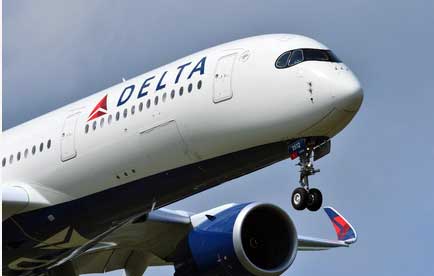Delta Flight Attendant’s Costly Mistake: $70,000 Lesson in Caution
A Delta Air Lines flight attendant’s error at Pittsburgh International Airport on Saturday, October 25, 2025, has resulted in a whopping $70,000 damage bill for the airline. The incident occurred when the crew member accidentally deployed an emergency evacuation slide on an Airbus A220, causing significant delays and disruptions.
According to reports, the flight attendants had armed the doors in line with standard pre-departure procedures as the aircraft prepared for pushback. However, the forward crew member, a veteran with 26 years of experience, mistakenly lifted the door handle while the system was still armed. This triggered the automatic deployment of the forward left-hand slide, which is the same door used for the jetbridge connection.
The deployment of the slide caused an operational standstill, with passengers temporarily trapped onboard until engineers manually detached the slide and reconnected the bridge. The incident not only delayed passengers but also incurred significant costs for the airline.
The Cost of the Mistake
Emergency evacuation slides are costly components, with replacements for smaller jets like the A220 typically priced between $50,000 and $70,000. In some cases, slides can be carefully deflated and repacked, but the process itself costs around $30,000 due to manufacturer handling and inspection fees.
What Went Wrong?
The incident highlights the importance of attention to detail and proper procedures in the aviation industry. According to PYOK, incidents like this are formally categorized as Inadvertent Slide Deployments (ISDs) within the aviation industry. These types of incidents can have significant consequences, including costly repairs and delays.
Delta’s Response
Delta Air Lines has not publicly commented on the incident, but it’s likely that the airline will review its procedures and training programs to prevent similar incidents in the future.
Industry Implications
The incident serves as a reminder of the importance of safety protocols and proper training in the aviation industry. With the increasing complexity of modern aircraft systems, it’s essential that crew members are adequately trained to handle emergency situations and avoid costly mistakes.
In conclusion, the Delta flight attendant’s mistake is a costly reminder of the importance of attention to detail and proper procedures in the aviation industry. As the industry continues to evolve, it’s essential that airlines prioritize safety and take steps to prevent similar incidents in the future.
Tips for Flight Attendants: Avoiding Inadvertent Slide Deployments
- Stay Focused: Always stay alert and focused when arming and disarming doors, especially when working with complex systems.
- Follow Procedures: Adhere to standard operating procedures (SOPs) and guidelines for arming and disarming doors.
- Double-Check: Verify that doors are properly armed or disarmed before proceeding with other tasks.
- Communicate Effectively: Clearly communicate with crew members and ground staff to ensure everyone is aware of door status.
- Regular Training: Participate in regular training and recurrent training to stay up-to-date on procedures and best practices.
Frequently Asked Questions (FAQs)
Q: What is an Inadvertent Slide Deployment (ISD)?
A: An ISD occurs when an emergency evacuation slide is deployed unintentionally, often due to human error or equipment malfunction.
Q: What are the consequences of an ISD?
A: ISDs can result in significant costs, including repair or replacement of the slide, as well as delays and disruptions to flight schedules.
Q: How can flight attendants prevent ISDs?
A: Flight attendants can prevent ISDs by following SOPs, staying focused, and communicating effectively with crew members and ground staff.
Q: What should passengers do if an ISD occurs?
A: Passengers should follow the instructions of flight attendants and remain calm. In most cases, passengers will need to disembark the aircraft while repairs are made.
Q: How common are ISDs?
A: ISDs are relatively rare, but they can and do occur. The aviation industry takes these incidents seriously and works to prevent them through training and improved procedures.
Q: Who is responsible for the costs associated with an ISD?
A: The airline is typically responsible for the costs associated with an ISD, including repair or replacement of the slide and any resulting delays or disruptions.
Additional Safety Tips
- Stay Calm: In the event of an emergency, remain calm and follow the instructions of flight attendants.
- Know Your Emergency Exits: Familiarize yourself with the location of emergency exits and evacuation slides.
- Follow Safety Briefings: Pay attention to safety briefings and follow the instructions of flight attendants.
By following these tips and guidelines, flight attendants can help prevent ISDs and ensure a safe and smooth flight for passengers.







